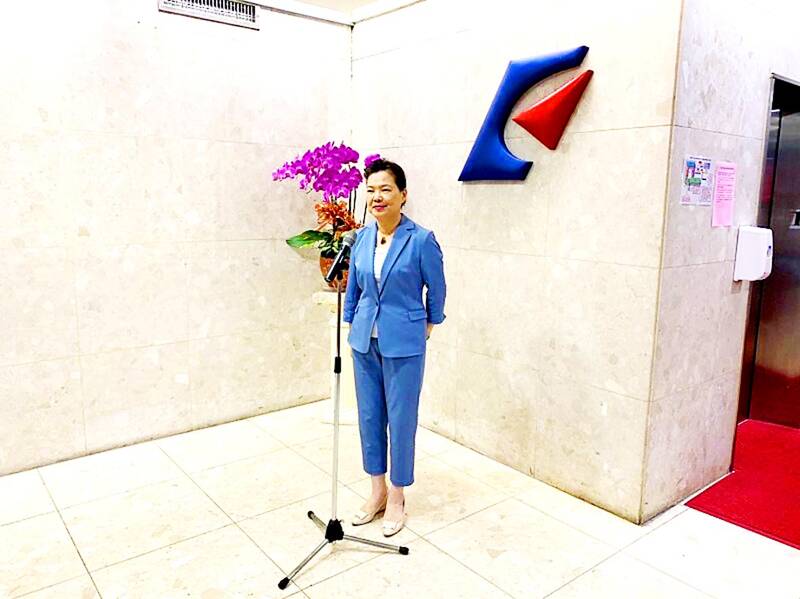Taiwan plans to maintain its energy policy of operating nuclear power reactors until the end of their desinged lifespan, and by using other energy sources to fill gaps in the energy supply, the Ministry of Economic Affairs said yesterday.
“Taiwan will stick to its nuclear power plant timeline. Despite differing opinions, we do not plan to shut down those reactors before of the end of their designed life cycles,” Minister of Economic Affairs Wang Mei-hua (王美花) told reporters in Taipei.
The state-run Taiwan Power Co (Taipower, 台電) has drafted several measures to secure a stable power supply, including electricity allocation plans to manage water shortages caused by climate change and surging energy costs resulting from the war in Ukraine, Wang said.

Photo: Ching Lin, Taipei Times
Japanese Prime Minister Fumio Kishida on Wednesday said that its government is considering using nuclear reactors beyond their designed lifespans along with restarting idled nuclear power reactors to manage a power crisis.
“My understanding is that Japan plans to make some arrangements about the idled reactors that were shut down following the Fukushima disaster in March 2011,” Wang said.
The government has decided to shift from nuclear power and move toward green power to cut carbon emissions.
The No. 2 reactor at Guosheng Nuclear Power Plant is set to stop operation in March next year, while the No. 1 and No. 2 reactors of the Ma-anshan Nuclear Power Plant are to close in 2024 and 2025 respectively, when they are due to reach the end of their operational lives of about 40 years.
Regulations stiputate that any adjustment to nuclear power operations be applied five years in advance, Taipower spokesman Wu Chin-chung (吳進忠) told the Taipei Times.
“The timing has passed,” he said.

NEW IDENTITY: Known for its software, India has expanded into hardware, with its semiconductor industry growing from US$38bn in 2023 to US$45bn to US$50bn India on Saturday inaugurated its first semiconductor assembly and test facility, a milestone in the government’s push to reduce dependence on foreign chipmakers and stake a claim in a sector dominated by China. Indian Prime Minister Narendra Modi opened US firm Micron Technology Inc’s semiconductor assembly, test and packaging unit in his home state of Gujarat, hailing the “dawn of a new era” for India’s technology ambitions. “When young Indians look back in the future, they will see this decade as the turning point in our tech future,” Modi told the event, which was broadcast on his YouTube channel. The plant would convert

‘SEISMIC SHIFT’: The researcher forecast there would be about 1.1 billion mobile shipments this year, down from 1.26 billion the prior year and erasing years of gains The global smartphone market is expected to contract 12.9 percent this year due to the unprecedented memorychip shortage, marking “a crisis like no other,” researcher International Data Corp (IDC) said. The new forecast, a dramatic revision down from earlier estimates, gives the latest accounting of the ongoing memory crunch that is affecting every corner of the electronics industry. The demand for advanced memory to power artificial intelligence (AI) tasks has drained global supply until well into next year and jeopardizes the business model of many smartphone makers. IDC forecast about 1.1 billion mobile shipments this year, down from 1.26 billion the prior

People stand in a Pokemon store in Tokyo on Thursday. One of the world highest-grossing franchises is celebrated its 30th anniversary yesterday.

Zimbabwe’s ban on raw lithium exports is forcing Chinese miners to rethink their strategy, speeding up plans to process the metal locally instead of shipping it to China’s vast rechargeable battery industry. The country is Africa’s largest lithium producer and has one of the world’s largest reserves, according to the US Geological Survey (USGS). Zimbabwe already banned the export of lithium ore in 2022 and last year announced it would halt exports of lithium concentrates from January next year. However, on Wednesday it imposed the ban with immediate effect, leaving unclear what the lithium mining sector would do in the